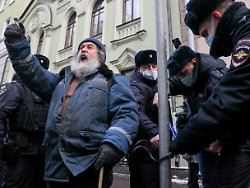Tuesday, December 28, 2021
Justice orders dissolution
Russian NGO Memorial: “Not the End”
The Foreign Agents Act is used against opposition members in Russia. The NGO Memorial has long been considered inviolable. Now this organization is also being condemned – this is causing global outrage. But the organization does not want to give up.
Notwithstanding international appeals, the judiciary in Russia has ordered the dissolution of the country’s most important human rights organization. The Supreme Court in Moscow justified its judgment against Memorial International with alleged violations of the so-called Foreign Agents Act. Memorial announced that it would act against the verdict and seek “legal remedies” to continue the work. Internationally, the judgment met with sharp criticism, the Federal Government expressed its lack of understanding and expressed concern.
Memorial has been campaigning for the coming to terms with the Stalinist crimes in the Soviet Union and for the protection of human rights in today’s Russia for more than 30 years. “We will challenge the decision of the Russian Supreme Court in any way we can,” the organization said. “And we will find legal ways to continue our work.”
Memorial attorney Tatyana Glushkova said the NGO was preparing a submission to the Supreme Court Appellate Body. Another lawyer from Memorial, Maria Eismont, had already stressed shortly after the verdict was pronounced: “This is not the end.”
Violation of the “Foreign Agent Law”
The responsible judge Alla Nasarowa justified the ban on Memorial with alleged violations of the organization against the “Foreign Agent Law”. In doing so, she followed the request of the public prosecutor’s office, which had accused the NGO of having repeatedly disregarded the law by not mentioning in its publications that it was classified as a “foreign agent”.
The forced dissolution of Memorial International marks a turning point in Russia’s history since the end of the Cold War. It is true that the Russian authorities have been taking rigorous action against opposition and civil society groups for years with the help of the controversial Foreign Agents Act. The Memorial organization, which was founded by dissidents around Nobel Peace Prize laureate Andrei Sakharov in the late 1980s, was long considered inviolable.
“More than incomprehensible”
The Foreign Office called the judgment against Memorial “more than incomprehensible”. The organization makes an “indispensable contribution” to the research and documentation of human rights violations, said a ministry spokeswoman. “The decision worries us not least because it removes the voice of the victims of oppression and repression.”
The US Ambassador to Moscow, John Sullivan, described the ban as a “tragic attempt to suppress freedom of expression and erase history”. France responded with “indignation” and “concern” to the ruling.
Before the Moscow court, Memorial supporters described the verdict as a “disgrace”. Several demonstrators were arrested. Leonid Bachnow, whose grandfather fell victim to the Stalinist purges in 1937, described the closure of Memorial as a “tragedy” for Russia.
The Secretary General of the Council of Europe, Marija Pejcinovic Buric, called the ban “devastating news” for civil society. Russia seems to be “moving further and further away from our common European standards and values”.
A thorn in Putin’s eye
The reappraisal of the Stalin regime promoted by Memorial is a thorn in the side of Russian President Vladimir Putin. The organization’s archive is the main collection of historical documents related to Stalinist crimes.
Memorial had “created a false image of the USSR as a terrorist state” and “denigrated the memory of the Second World War,” the public prosecutor accused Memorial in the closing speeches. The prosecution had previously also accused Memorial of “rehabilitating Nazi criminals”.
In the official history of the Kremlin, Stalin is almost exclusively recognized as a war hero and conqueror of National Socialism. In this reading, the coming to terms with the Stalinist crimes is interpreted as a trivialization of National Socialism.
The Memorial Human Rights Center is also threatened with closure. Another hearing in the trial of the Memorial sub-organization is scheduled for Wednesday. The public prosecutor’s office has also accused her of violating the Foreign Agents Act, as well as the charge that the center glorified “terrorism and extremism”.
The Memorial Human Rights Center supports political prisoners in Russia, among other things. This year it also pointed to the fate of the imprisoned opposition politician Alexei Navalny. His team reported the arrest of supporters of the opposition politician on Tuesday.
